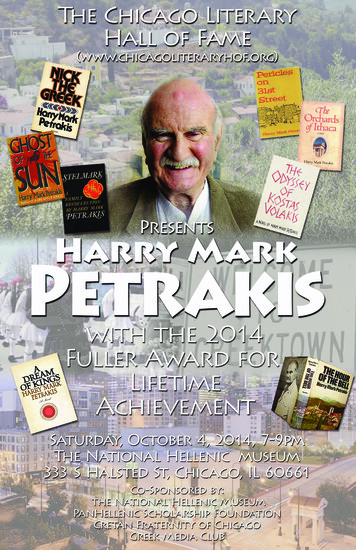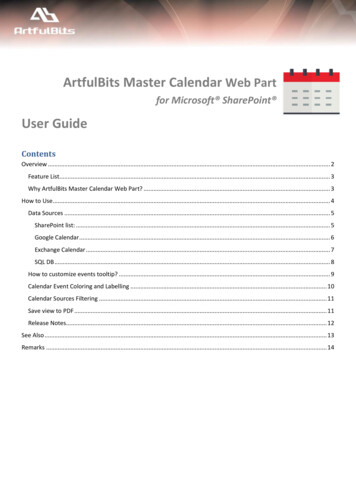
Transcription
2014 Fall/Winter Literary CalendarNov-Oct. 12: Native Son, Court Theatre, 5535 S. Ellis Ave.Oct. 11: 53rd Chicago Book & Paper Fair presented by MidwestAntiquarian Booksellers Association (MWABA), Plumbers UnionHall, 340 W. Washington Blvd., Chicago, 10 a.m.-5 p.m.Oct. 14: Algren, Chicago International Film Festival, AMC TheatresRiver East 21, 6 p.m.Oct. 16: Poetry Day, with Carolyn Forché and Jamaal May, CindyPritzker Auditorium, Harold Washington Library Center, 400 S. StateSt., 6 p.m.Oct. 20: Algren, Chicago International Film Festival, AMC TheatresRiver East 21, 12:15 p.m.Oct. 21: Algren, Chicago International Film Festival, AMC TheatresRiver East 21, 8 p.m.Oct. 23: Carl Sandburg Literary Awards Dinner. Honoring DorisKearns Goodwin, Larry McMurtry and Veronica Roth. The UICForum, 725 W. Roosevelt Road, 6 p.m.Oct. 24-26: Chicago Writers Conference, featuring Sara Paretsky,University Center, 525 S. State StreetOct. 25: Cliff Dwellers Book Club, featuring Michael Hainey’s AfterVisiting Friends: A Son’s Story, Author will be present. The CliffDwellers, 200 S. Michigan Ave. 11 a.m.Nov. 1: Chicago Tribune Literary Award, honoring Patti Smith,Symphony Center, 220 S. Michigan Ave.Nov. 1: Chicago Tribune Heartland Prizes, honoring, DanielWoodrell in fiction and Jesmyn Ward in non-fiction, HaroldWashington Library Center, 400 S. State St.Nov. 9: Curbside Splendor Pop-up Book Fair, Thalia Hall, 1227 W.18th St.Dec. 6: 2014 Chicago Book Expo. Columbia College, 1104 S.Wabash Ave.Dec. 6: Chicago Literary Hall of Fame’s 5th Annual InductionCeremony. Roosevelt University’s Ganz Hall, 430 S. Michigan Ave.,7-9 p.m.Jan. 24: Chicago Writers Association’s 4th Annual Book of the YearAwards, The Book Cellar, 4736 N. Lincoln Ave., 7 p.m.Feb. 6-8: Love Is Murder, Mystery Writer & Readers Conference, InterContinental Chicago O’Hare Hotel, 5300 N. River Road, RosemontTonight’s Program7 p.m.: Doors and Bar Open7:30: Opening Remarks: Dan Mihalopoulos (Emcee)Reading: Robin MetzGreek Streets (video presentation):Marco Benassi and Tim ClueThe Island of Crete: John ManosReading: Patrizia AcerraOld Friends: Bill BrashlerReading: Liz Carlin MetzFamily: John PetrakisPresentation: Judge Charles KocorasAcceptance: Harry Mark Petrakis8:15 p.m.: Reception1
What is the Fuller Award?“The Fuller” is awarded by the Chicago Literary Hall of Fameto a Chicago author who has made an outstanding lifetimecontribution to literature.The Fuller Legacy: A Quick Look at a Literary PioneerThe award was inspired by the literary contribution of Henry BlakeFuller, one of Chicago’s earliest novelists and author of The CliffDwellers and With the Procession. Both novels use the rapidlydeveloping city of Chicago as their setting and are considered bymany to be the earliest examples of American realism.noble and one should excel attheir craft. The patron of artistsand craftsmen, he seemed afitting symbol to capture the spiritof excellence embodied by theChicago Literary Hall of Fame’sFuller Award.Theodore Dreiser called With theProcession the first piece ofAmerican realism that he hadencountered and considered itthe best of the school, evenduring the days of his ownprominence.There are additional layers ofmeaning to the word “fuller.”A fuller is also a tool used toform metal when it’s hot, animportant part of building and anice metaphor for Chicago, hometo the “First Chicago School” ofarchitecture that rose up fromthe ashes of the Chicago Fire of1871. Between 1872 and 1879,more than ten thousandconstruction permits wereissued. Chicago emerged as a resilient city that took risks and madebold decisions—using iron and steel to frame its buildings, giving riseto the world’s first skyscraper. Thefuller was one such tool that made it happen, a symbol of possibilityand perseverance.Inspired by the sleek lines and art deco style of Chicago sculptorJohn Bradley Storrs, whose sculpture Ceres is on top of the Board ofTrade building, the award statue for the Fuller was based onHephaestus, the Greek god of the blacksmith’s fire and patron of allcraftsmen. According to legend, Hephaestus was the only god whoworked, and he was honored for having taught mankind that work is2Ron Swanson made the originalstatue in clay for the first FullerAward ceremony in 2012. Thesculpture Harry Mark Petrakis willreceive tonight is a polyurethanecast copy with a faux bronzefinish on a wood base. Ronbegan as an artist back at LarkinHigh School, in Elgin, where hewas honored as a top artist in thegraduating class of 1991. He hasstudied sculpture, photography,and industrial design. In hisworking career, Ron has createdlarge fiberglass sculptures,projects for a variety of toycompanies, public art, digital sculptures and 3D printing. Healso started his own company, R.E.Sculpture, Inc., doingsculpture work for Tomy, Wilton, Hasbro and other companies.3
FriendsTBy Donald G. Evanshe Greek word “parea” means a group of friends who gathertogether to enjoy one another’s company. Lifelong companions,the members of a parea do not necessarily meet regularly, butshare a spiritual bond. Author Harry Mark Petrakis has known five orsix such groups in his life. These eclectic groups—pharmacists andteachers and editors and doctors and lawyers—shared birthdays,holidays and Christenings together. They nurtured and cherishedtheir friendships.“Friendship has been so important,” Harry says. “One writer oncesaid, ‘life without a friend is death without a witness.’ I treasure myfriendships.”John Blades, the former Chicago Tribune book editor, met Harry inthe mid-1960s through Jack McPhaul, a veteran Chicago crimereporter and historian. Along with McPhaul, Blades became part of aparea that included authors Bill Brashler and Larry Heinemann,photographer Steve Deutch, and playwright/poet Bill Lederer, amongmany others. The friends would get together on Halsted Street— atDiana’s Grocery or the Parthenon—and later at Harry’s house at theIndiana Dunes. Kids and friends of kids would be welcome. A feastwould be set out around a big table filled with people, and Harrywould mesmerize hisaudience with readingsfrom his latest work.“If Harry knows you, he’syour friend,” says John.But as Harry one by onerecalls these friends, herealizes they are dead,disabled, sheltered innursing homes, scatteredabout the globe, or simplylost to the ethers of oldage.Harry is 91 and hasoutlived a lot.Musci beatemOstius, quis videseq uuntorest,sustibeate lab inveniaspid ea dolo id et odisendandia ist, ut facius as vellaborae dolor alignis4“These pareas are gone,”he says.Taken together, thecharacters in Harry’s25 books, written overthe past six decades,form a kind of literaryparea. These gamblersand gangsters, priestsand peasants, cabbiesand cooks, theyappear and reappear, Harry accepting the PanCretan Awardin his memoirs, shortstories and novels, their overlapping stories blossoming with eachtelling. They are generations upon generations of the lucky and thecursed.Kurt Vonnegut once blurbed, “I’ve often thought what a wonderfulbasketball team could be formed from Petrakis characters. Everyoneof them is at least fourteen feet tall.”Harry started writing in the late 1940s, and it took him nearly adecade before he experienced any publishing success. In thebeginning, Harry wrote about cowboys, prostitutes, farmers—allmanner of characters of which he knew little or nothing. He turned toGreek characters modeled on the people he knew from his father’sparish--St. Constantine and Helen, then at 61st and Michigan. It wasthen that his authorial voice started to sing.From that point on, Harry committed to telling, in a variety of waysand forms, a version of the truth. Or at least exploding a literaryversion of the truth. He suffered through tuberculosis as a child,gambling addiction as a young married man, suicidal depression inhis middle years. His characters, much like himself, possess a kindself-awareness and honesty that translates into his literature.It’s all there, and more, in Harry’s oeuvre, up to and including hiscompleted memoir, Song of My Life, which will be published later thisyear.The tragic flaw is a staple of Greek mythology, and Harry certainlydraws upon those stories. But Harry’s characters are mostly flawed;their strengths are hidden beneath all those dents and dings. Theseare characters who hope not just for salvation but an improbablelargeness.Matsoukas, of Dream of Kings and Ghost of the Sun, cheats on hiswife, cheats at poker, wastes his precious money gambling, pursuesdead-end business ventures, and wiles away his time while his family5
struggles. But his love for Stavros, his dying son, so permeates hisbeing that we see Matsoukas not as a villain but a soulful man whohas been derailed by circumstance, romanticism and recklessdreaming. He wants to cure Stavros and though he won’t, can’t, thatbig dream shows a loyalty, fierceness and love greater than all hisflaws put together.Nick is a degenerate gambler, at times exercising virtuoso skill anddiscipline and at other timesstubbornly playing on until hebusts out. He risks not only hisown livelihood and safety, butthose of his loved ones. evenforsaking his fiancé for anotherrun at the tables. But Nick isgenerous and loyal to a fault,and abides by a code that putsfamily and friends on a pedestal.He shows gratitude and respectIgnatesenis et voluptatem esequias quaein a world devoid of both.vidipsapeEhenet, quatempor atio. Ri duspari omni repudipis aut pa doloreperio etMike hovers over a dying breedof icemen in The Twilight of the Ice, so prideful and passionate thathe literally works himself to death. He is hard on himself and hard onothers, but through it all we see Mike as a community builder. Hesilently accepts responsibility for his apartment building’s upkeep, hiswork place, his neighborhood. More so, he acts upon his instincts tomake a better slice of the world, putting aside prejudices--againstprostitutes, Turks, the younger generation—for the common good. Heultimately sees people for whom, not what, they are, and dismisseshis own heroic accomplishments as nothing. Mike’s humility isinspiring, but it also amplifies the idea that the littlest of the littlepeople can make a profound impact.Barboonis. The Turkish gorilla, Youssouf. The old dealer, Cicero. Thebutcher, Dan Ryan. The strong, beautiful Caliope. The defiant Marina.The beaten-down lunchroom owner, Javros. The new husband,Sopocles. The legendary gambler, Nestor. The widow, Katerina. Thesteel-working descendent of Pericles, Angelo. The peace-lovingpriest, Father Markos. The legendary old Suli warrier, Boukouvalas.The tough, vengeful wife, Nitsa.“I’ve been fortunate, that from the shambles of my beginnings I’vebeen able to tell my stories,” says Harry. “I’m a writer, doing the bestthat I can.”Our Host: The National Hellenic MuseumThe National Hellenic Museum is the first andonly major museum in the country dedicated tothe Greek journey, from ancient times to themodern Greek American experience. Chicago hasone of the world’s largest Greek populations. ButGreek or not, this journey touches everyone.Greek history and culture is at the very foundationof western civilization, and continues to influenceour lives to this day. Our government, language,architecture and theater all have their roots in ancient Greece.Located in a new 40,000-square-foot space that is bothcontemporary and timeless, the Museum connects all generations—past, present and future—to the rich heritage of Greek history,culture, art and the Greek American experience. Since 1983, theNational Hellenic Museum, previously known as the Hellenic Museumand Cultural Center, has been striving towards this mission.And on and on.Harry has put a lot of distance between himself and the persistentrejection of his early writing years. His books have been on thebestseller list, made into Hollywood films, been adorned withprestigious prizes, and generally garnered respect and praisebefitting the literary elite. He’s taught in the ivory towers of places likeSan Francisco State University, befriended famous authors likeGwendolyn Brooks, and received flattering reviews from severalNobel Prize winners, including Elie Wiesel and Isaac Bashevis Singer.But in the end, it is the characters, this literary parea, that will outlasteverything. The short, fat grocer, Akragas. The tart-tongued67
FA Writer: Plain and Simpleor Greek families in Chicago, Harry Mark Petrakis is requiredreading. He speaks to the particular experiences of those menand women trading their lives in Greece for new opportunities inAmerica, while simultaneously trying to hold on to their ethnicidentities. He speaks to the mothers laboring to raise broods whilecontributing to the family businesses; he speaks to fathers worriednot just about supporting their nuclear families but families backhome; he speaks to children fully assimilated in the Americanlanguage and customs but wanting still to belong to that world oftheir parents. Harry’s stories areguidebooks, cautionary tales, andnostalgia rolled into one.“To be lost in a babble of voices is to bemute,” Chicago author Stuart Dybekwrote recently in praise of Harry’snewest book. “Chicago writers--AfricanAmerican, Asian, Hispanic, Irish, Jewish,Polish--have set themselves totransforming a turbulent city’s port ofentry babble into the mnemonic clarityof beauty of story and song. That iswhat Harry Mark Petrakis has done forthe Greek community over a lifetime ofempathetically powerful novels. Thatvision is the gift to American that hecontinues to give us all. “Perhaps because Harry’s books are sopowerful and meaningful to thissegment of the population, critics fromtime to time label him a “Greek author.” That label tends to suggestthere are certain prerequisites to appreciating Harry’s works, like howoverweight people—and only overweight people--get matched todiet books.“I resist the appellation ethnic writer,” says Harry. “Bellow was Jewish,Faulkner Southern, but that is just a beginning. I grew up in that kindof cloistered Greek community. That was what I knew. But at acertain point you cross a threshold, your characters are not Polish orJewish or Greek, they’re human. You use that which is identifiable toyou, and then you move on.”Dan Mihalopoulos, a star investigative reporter for the Chicago Sun-8Times and tonight’s emcee, began reading Harry as a teen. “I guessthe thing that impressed me the most was that someone had written,in English, about our unique little sub-culture,” he says. “It struck methat he really told a good story, and he infused his tales with a senseof the Greek-American love for not only food, faith and family but alsopolitics and other human intrigue. He didn’t sanitize this world, either,by the way. His work resonated with me because I saw myself asboth fully an American of Chicago and fully immersed in my ancestralculture.”Dan pinpoints the reasons Harry is so popular among Greekimmigrants, and the children of Greek immigrants. It is their life, afterall, that is being dramatized. But in the same sweep of the pen, Harrytranscends the Greek, the Chicago, and explores universal ideas likeacceptance, love, freedom, hope, ambition, family, friends, and on andon.When Mike, the Greek iceman, feuds with his Turk colleague,Suleiman, in The Twilight of the Ice, the tension is not specific toeither nationality. Mike, through Harry’s treatment, finds his way tosomething like open-mindedness. He puts away ancient grudges andgives the Turk the benefit of being a singular human being. Likewise,in the Hour of the Bell, an historical novel that revolves around theGreek revolution for independence from Turk rule, themes such asthe violent nature of man take precedence over the more particularoverarching theme.“When I read his work for the first time, among the first things Ithought was, that he had described Greek Americans so accurately,”says Maria Karamitsos, associate editor of The Greek Star and also aco-founder of the Greek Media Club. “But also, that these characterswere so human. The characters could have been immigrants fromanywhere else in the world. His characters were identifiable andrelatable. What also struck me was the way he told the story. I wascaptivated. I couldn’t wait to read another Petrakis story. I wanted toread all of them.”But when Harry gets tagged an ethnic writer, it’s not just that hischaracters are Greek, or that they identify so closely with theirethnicity. Harry’s characters and plots sometimes closely followmythological story lines. His characters are often named after GreekGods and Goddesses. Artifacts, such as the alabaster model of theheadless and armless Aphrodite of Cyrene, suggest Greekmythological heroes.“His technique of insinuating Greek myths into the lives of workingclass Greek immigrants might have looked like it was closing in on9
magic realism had some of those books been published 20 yearslater,” says Roosevelt University Professor of Humanities Gary Wolfe.“Remember, it was about the same time Updike was doingsomething similar in The Centaur, but with no interest whatsoever inactual Greek culture.”Praise for Harry’s work has come from all quarters, praise mostlyblind to everything but the quality of the craftsmanship. JohnCheever and Isaac Bashevis Singer ranked Harry among the world’sgreatest writers, Greek or not. Nobel Prize winner Elie Wiesel said, “Inhis tales, violence is measured by brotherhood, passionate hate bypassionate love. And in the end it is man who, despite hisweaknesses and his blindness, has the right to victory.”Everybody is right. Harry is surely one of the best Greek-Americanwriters of his generation. He is one of Chicago’s all-time best writers.And, simply, he is near the top of our greatest literary writers, period.“Few writers in the history of Chicago have worked more diligentlyand passionately at their craft than Harry Mark Petrakis,” saysChicago Tribune journalist and WGN radio personality Rick Kogan.“He persevered through a lot of struggles to become one of the mostarticulate and thoughtful voices in the history of literature.”A Living Wage“TBy Donald G. EvansThe one thing worse than a poor young writer is a poor oldwriter,” says Harry.For Harry Mark Petrakis, like many serious writers, hisliterary labor had to be funded. He has worked long hours these pastsix decades inventing, plotting, drafting, revising, tweaking andediting. Stories. Novels. Essays. Memoirs. Nonfiction books. Alone inthat writing room, Harry entered all manner of invented worlds, butoutside the real world demanded payment for rent, utilities, clothes,diapers, baby formula. There were car payments, gas money, pocketmoney. The mail--all those notices and reminders--did not stop toaccommodate his art.Of course, we know the end to this story, and it is a story that mostlygets told about the successful authors. Harry has gone on to publish25 books, as well as essays and stories in the most prestigiousmagazines, newspapers and literary journals. He has twice beennominated for the National Book Award in fiction; he won the O.HenryAward; was given he Chicago Public Library’s Carl Sandburg Award,as well as awards from the Friends of American Writers, Friends ofLiterature, and the Society of Midland Authors. He has adapted hisstories and novels for film and television. So it is easy to say, “Aha,told you so!” or “It was all worth it.”But success was never guaranteed, even for a writer of Harry’simmense talent.“The field is littered with these wonderful writers whose work is notknown,” says Harry, using his now-deceased friends William Stevensand Gladys Schmitt as examples. “[William] was a magnificent writer,but there was no entry of any kind for him. [Gladys] wrotemonumental books. Whenever I want to feel humbled I read a fewpages of her work.”Harry dropped out of Englewood High School as a sophomore, andwith no education or marketable skills took what employment availeditself.What availed itself were grinding, unattractive positions he founddifficult to keep.Harry hauled crates onto and off of a beer truck; ran an industriallunchroom; poured sodas and delivered prescriptions at a drug store1011
fountain; sold package liquor; unloaded packages from the railwaycar at the 12th Street station.“I pressed cloths for a cleaner--an onerous profession,” says Harry.“Steam releases this fuselage of odors--shit and piss on the pants. Iremember once pulling a soiled pair of pants on the floor, and I toldMax, ‘I quit!’ Max said, ‘I wish I worked for somebody else so I couldquit too.’ ”He was a dispatcher at the icing company on 15th and Halsted calledTeam Track, and answered complaint letters at Simoniz Waxcompany that went something like, “I’m very sorry your experiencewith our wax was not satisfactory. ““Simoniz Wax company fired me on a Friday afternoon,” Harry says.“Diana cried, and my mother in law slapped her head, as if I andJesus were both being crucified.”At U.S. Steel, Harry wrote production sheets and picked up overtimein the bone yard. He sold real estate out of Baird & Warner’s HydePark and South Shore offices. He swept up after the degenerategamblers in betting parlors, like the shanty near the 12th Streetrailroad station that had a sign warning, “Don’t piss on the walls.” Youname it—fleeting positions imbued with drudgery and despair. “Allthe jobs that look so attractive on the book jacket are hell whenyou’re going through them,” he says. “The truth is, I had no otheraccess to employment, had no training. I couldn’t get a white-collarjob. These were the jobs I was forced into. Diana’s mother thought itwas a terrible idea to marry somebody at 21 with no prospects.”Finally, in late 1956, The Atlantic accepted Pericles on 31st Street, andHarry revived the joy he’d experienced as a boy reading to hisKoraes Elementary School classmates and then as a fledgling writerfooling Columbia College peers into believing his fiction had to bebased on reality. When he received the acceptance note, Harrypractically guffawed, part happiness and part relief, for himself, hiswife Diana and his three sons. He was 33 years old and had a sensethat he had made it, though of course it wasn’t and never would bethat simple.“That was after ten years of writing and rejection slips,” he says.The Atlantic paid Harry 400 for that story, and then added a bonusof 700 as recognition for Pericles being deemed the best of themagazines “firsts.”Soon, Harry made the decision to be a freelance writer, despite thewarnings from agents, publishers, friends—everybody, basically—12saying, “Don’t do it!”“That was a reckless undertaking,” Harry admits.He made about 1,600 that first year as a professional writer; around 2,200 the next.Magazine money was better back in Harry’s early publishing years,but still hardly a fortune relative to the time it took to finish top-qualitywork. Playboy once paid him 2,500 for a story, the most he hadmade until Land’s End gave him five grand each to place three of hisstories in their catalogue.“We call the remodeling of our kitchen, the Land’s End Kitchen,”Harry says.With publishing success, Harry’s reputation as a serious literaryfigure grew. That increased his ability to make money in academia,and on the lecture circuit.“I had been an actor in school,” Harry says. “They would put onthese tragedies in Greek. I played the parts of Agamemnon, Oedipus,Creon. It was real training for public speaking later on; it gave meboth Thespian training and some confidence.”By his last count, Harry had been to 73 writers conferences,including five times at the University of Rochester, five times atIndiana University and five times at the University of Wisconsin. Harrywas Columbia College’s very first writer-in-residence. He has heldappointments at Ohio University as McGuffy Visiting Lecturer and atSan Francisco State University as Kazantzakis Professor in ModernGreek Studies.“We wouldn’t have been able to live on the writing alone,” Harry says.“The reading and lecturing sustained us. I developed a reservoir oflectures, and really lived on those.”Indeed, hardly any writers could. Can. There are bevies of grimstatistics available, most in agreement that only the top couplepercentage of all writers earn enough to subsist. Writers have to dosomething else—something that comes with a check.“It’s always a struggle,” Harry says. “It’s a very tenuous profession, aprofession where you love what you do and can only see yourselfdoing it—so damn the consequences.”In the late 1970s, the Chicago Public Library hired Harry to set upwriting workshops at the Edgewater branch. The program was sosuccessful, Harry wound up visiting 27 libraries in two years. Thatsuccess led to a Board of Education gig, in which Harry was its13
writer-in-residence. He would drive each day to grade, middle andhigh schools, visiting 63 schools before his two-year tenure ended. “Itwas a great experience,” says Harry. “I went all over the city, inneighborhoods I didn’t even know existed, like Jenner School, underCabrini Green.”experiences are fodder for literature, and Harry’s oeuvre is absolutelysparkling with stories born in tedium, agony and sacrifice.All this time, Harry was churning out new books, each with thepromise of additional income, perhaps even financial stability. Withhis fifth book, Dream of Kings, Harry hit it big. The novel stayed onthe New York Times bestseller list three months; became a BookClub selection; was translated into a dozen languages; and the rightswere eventually sold to National General to make a feature-lengthfilm. Harry was hired to write the script.We’ll bring folks from our club. Bring some of our youth clubs tocome. College age kids. As well as sort of our main chapter.“Today it would be much bigger,” Harry said. “Then, it was good for afew years then back to the grind again. There was a little moneycoming over period of a few years from the film, but that was aboutit.”Dan: I think I first became aware of Harry when he came to speak atmy Greek Orthodox parish in the suburbs. I may have been too smallto have listened at that time. But my parents -- both of whomemigrated from Greece -- and other immigrants at the church wereclearly impressed that there was “a Greek writer” among us. (Mymom is from Achladokambos, a small village in the Peloponesusregion. She came to Chicago when she was 12, in 1960. My dadcame here from Tripoli in 1970, aged 24, and met my mother twoweeks later.)That success led to a three-book deal from Doubleday, and hefulfilled the contract with Nick the Greek, Hour of the Bell andVengeance.“I never earned the advances I got from Doubleday,” says Harry.“They never got their money back. The books made some money,but not enough.”In the early 60s, before Dream of Kings, Harry had written abiography of Paul Galvin, who had founded Motorola. Herman Koganhad recommended his friend Harry, who worked two years, knockingdown good commission checks, to finish that book. Paul Galvin’sson, Bob Galvin, liked the book immensely, and around 1988commissioned Harry to write the company’s corporate history. Thatwas followed by work on a biography of Henry Crown.“I spent most of the 90s on commission work,” says Harry. “It tookme away from writing my own books. But these books allowed us forthe first time to build a modest estate, travel around the world. I’mgrateful. I don’t regret it.”When Harry talks about his life, he almost always uses “us” or “we”rather than I. He is extremely grateful to his family-- wife, Diana, threesons (Mark, John and Dean) and now four grandchildren. He haswritten extensively about their support, always sensitive to thehardships they endured.ProgramDid get you musicians. They’re not professional musicians. Two,stringed instrument. Talk to them. Older.Kids to dress up. see if I can get some by today. Maybe two to fourkids. College or younger.Somehow, I found Harry’s books as a a teen. I knew Greektown, ofcourse, but only as a restaurant row. I was fascinated by hisdescription of Greektown when it was truly a neighborhood, in theera when you could walk to a church or an ethnic grocery store orcoffeehouse. It was a world that was both familiar to me and alsosomething of a lost world, since most of us Greeks lived in thesuburbs by that point.I guess the thing that impressed me the most was that someone hadwritten, in English, about our unique little sub-culture. It struck methat he really told a good story, and he infused his tales with a senseof the Greek-American love for not only food, faith and family but alsopolitics and other human intrigue. He didn’t sanitize this world, either,by the way. His work resonated with me because I saw myself asboth fully an American of Chicago and fully immersed in my ancestralculture.There is no doubt that Harry’s lifetime of writing has also been alifetime of other work. The saving grace for a writer is that those1415
Song of My Life A MemoirNine decades of life. Six decades writing top-shelf literature.Harry’s third memoir, Song of My Life, will be, from allaccounts, as revealing and compelling as any of his other24 books to date. Harry writes vividly, frankly, and critically on topicsranging from the near-fatal childhood illness that compelled himtoward a literary life, to his youthful gambling addiction, to theenormous lie of his military draft, to a midlife suicidal depression.He writes lovingly about hisparents and five siblings, withnostalgia as he describes theGreek neighborhoods andcramped Chicago apartmentsof his childhood, and with deepaffection for his wife and sons ashe recalls with candor, comedy,and charity a writer’s long, fullylived life.Some of this ground has beencovered in Reflections: Journalof a Novel,, Stelmark and Talesof the Heart. But even the oldterritory is approached from afresh perspective, that of a mancontemplating his life and itsapproaching end.“I went back over areas I hadwritten about before, parents,siblings, friendships, butwent at them wit
1 2014 Fall/Winter Literary Calendar Nov-Oct. 12: Native Son, Court Theatre, 5535 S. Ellis Ave. Oct. 11: 53rd Chicago Book & Paper Fair presented by Midwest Antiquarian Booksellers Association (MWABA), Plumbers Union Hall, 340 W. Washington Blvd., Chicago, 10 a.m.-5 p.m.










